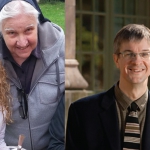News
On behalf of everyone at the Kazickas Family Foundation we'd like to congratulate two very special individuals who have been working with the foundation for many years - Sister Igne Marijošius and prof. Guntis Šmidchens! On Lithuania's Restoration Day, President of Lithuania Gitanas Nausėda thanked 34 individuals for their dedicated work for Lithuania and honored them with a special merit award. Among all the extraordinary recipients, were Sister Igne Marijošius and prof. Guntis Šmidchens.
Sister Igne is a person who has been for many years and still is undeniably the greatest force of Neringa Camp in Vermont. Starting as a camper herself at the girls’ camp in Putnam, over the years Sister Igne, together with the Sisters of the Imaculate Conception turned it into a fun, valuable and unforgettable summer opportunity for over 25,000 children of Lithuanian descent so far.
In Lithuania, Sister Igne, together with the Sisters of the Poor (Vargdieniu seserys), initiated the renovation of the Holy Cross Monastery and started the Holly Cross social assistance center that offers various programs, such as after school day center "Children of the Old Town" for kids, active living program for seniors, center "the Light" for the homeless, free laundromat service for people in need and more. Struggling, isolated, lonesome, disabled, unemployed or any people in need can find free legal, psychological or spiritual consultations here.
Prof. Guntis Šmidchens has established the Baltic Studies program at the University of Washington at Seattle. The Kazickas Family Endowed Professorship in Baltic Studies was established in 2009 to enhance University's ability to attract and retain distinguished faculty in Baltic Studies, with a preference for those whose first field of teaching and scholarship is centered on Lithuania. Šmidchens, a graduate of Indiana University, helped establish the program and continues to direct it today. Šmidchens studies the culture and history of Lithuania; recently published a book "The Power of Song" where he surveyed the history of Baltic singing traditions from the 18th century to the successful end of the Singing Revolution in 1991. Currently he is working on a sequel, tracing out developments in Baltic singing traditions over the past 30 years of independence.

